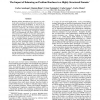Free Online Productivity Tools
i2Speak
i2Symbol
i2OCR
iTex2Img
iWeb2Print
iWeb2Shot
i2Type
iPdf2Split
iPdf2Merge
i2Bopomofo
i2Arabic
i2Style
i2Image
i2PDF
iLatex2Rtf
Sci2ools
125
Voted
AAAI
2006
2006
The Impact of Balancing on Problem Hardness in a Highly Structured Domain
Random problem distributions have played a key role in the study and design of algorithms for constraint satisfaction and Boolean satisfiability, as well as in our understanding of problem hardness, beyond standard worst-case complexity. We consider random problem distributions from a highly structured problem domain that generalizes the Quasigroup Completion problem (QCP) and Quasigroup with Holes (QWH), a widely used domain that captures the structure underlying a range of real-world applications. Our problem domain is also a generalization of the well-known Sudoku puzzle: we consider Sudoku instances of arbitrary order, with the additional generalization that the block regions can have rectangular shape, in addition to the standard square shape. We evaluate the computational hardness of Generalized Sudoku instances, for different parameter settings. Our experimental hardness results show that we can generate instances that are considerably harder than QCP/QWH instances of the same ...
AAAI 2006 | Intelligent Agents | Problem Hardness | Random Problem Distributions | Sudoku Instances |
Related Content
| Added | 30 Oct 2010 |
| Updated | 30 Oct 2010 |
| Type | Conference |
| Year | 2006 |
| Where | AAAI |
| Authors | Carlos Ansótegui, Ramón Béjar, Cèsar Fernández, Carla P. Gomes, Carles Mateu |
Comments (0)

